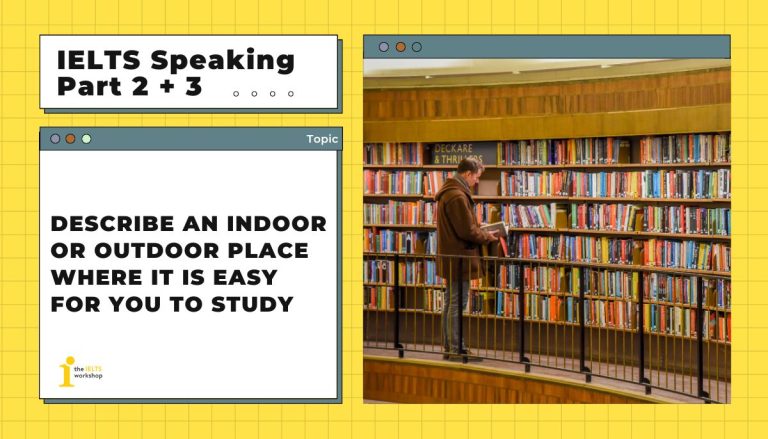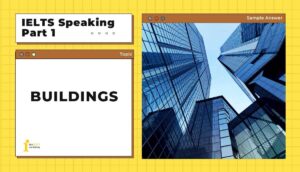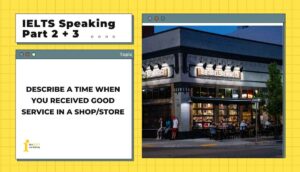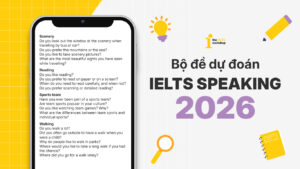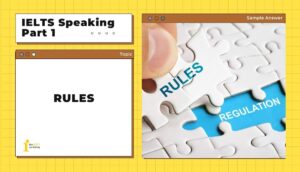Trong bài giải mẫu lần này, thầy Đình Tân của The IELTS Workshop sẽ hướng dẫn bạn trả lời topic “Describe an indoor or outdoor place where it is easy for you to study“ trong IELTS Speaking Part 2. Cùng tham khảo sample, từ vựng và một vài cách diễn đạt ghi điểm trong phần thi IELTS Speaking nhé.
Part 2: Describe an indoor or outdoor place where it is easy for you to study
Describe an indoor or outdoor place where it is easy for you to study
You should say:
Where it is
What it is like
When you go there
What you study there
And explain why you would like to study in this place
Dưới đây là bài mẫu cho topic “Describe an indoor or outdoor place where it is easy for you to study“.
1. Bài mẫu (Sample)
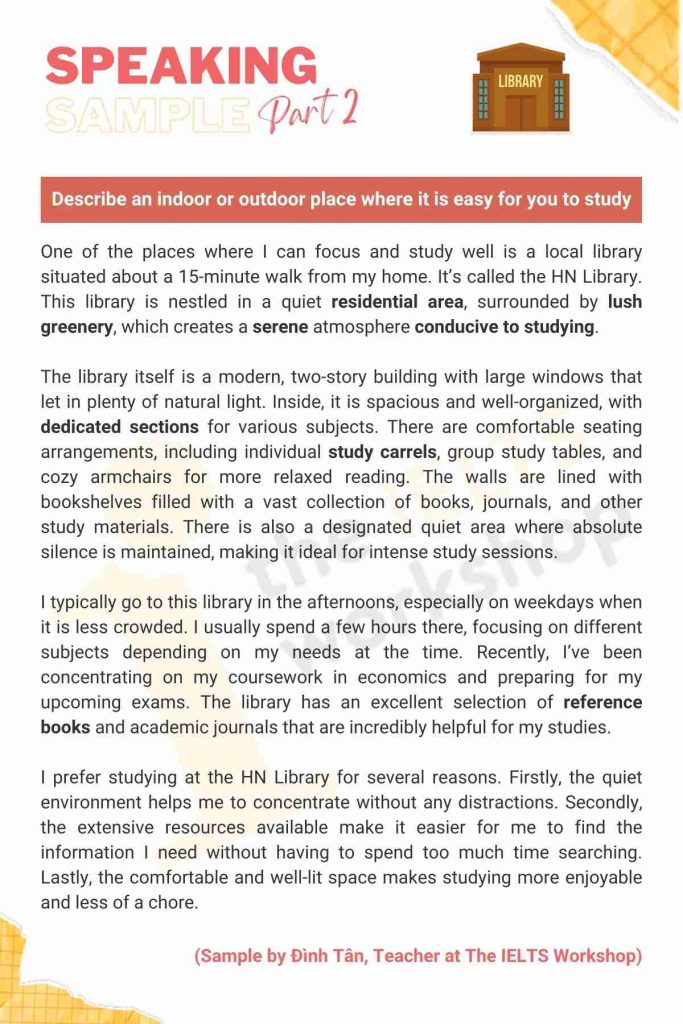
2. Từ vựng (Vocabulary)
- Residential area: Khu dân cư
- Lush greenery: Cây xanh tươi tốt
- Serene (adj): Thanh bình
- To be conducive to something: Thuận lợi cho việc gì
- Section: Khu vực
- Dedicated (adj): Dành riêng
- Study carrel: Bàn học cá nhân
- Reference book: Sách tham khảo
Part 3:
Bên cạnh Part 2, bạn hãy tham khảo thêm Part 3 cho chủ đề này nhé
Do you like to learn on your own or with others?
What’s the difference between learning face-to-face with teachers and learning by yourself?
Do you prefer to study at home or study in other places?
What are the benefits of gaining work experience while studying?
Do most people like to study in a noisy place?
What are the advantages and disadvantages of studying with other people?
1. Do you like to learn on your own or with others?
I appreciate both independent study and learning with others. On the one hand, studying alone allows me to focus deeply and pace myself, which is crucial for understanding complex topics. On the other hand, learning with others is equally beneficial because it fosters idea exchange and clarifies misunderstandings. Group discussions can deepen my knowledge and enhance my communication and teamwork skills. Balancing the two methods maximizes my learning potential by combining personal exploration with collaborative problem-solving.
- Pace oneself: Điều chỉnh nhịp độ, tốc độ của ai đó
- To foster something: Thúc đẩy cái gì đó
- Idea exchange: việc trao đổi ý kiến
- Clarify (v): làm rõ
- Maximize (v): tối đa hóa
2. What’s the difference between learning face-to-face with teachers and learning by yourself?
In-person study with an instructor allows for immediate feedback, explanations, and structured lessons, making it more efficient and motivating. In contrast, learning on your own offers flexibility and independence, letting you study at your own pace and choose your interests. However, it can be challenging without direct support. Both methods have their benefits and can complement each other well.
- In-person (adj): Trực tiếp, mặt đối mặt
- Immediate (adj): Ngay lập tức
- Structured lesson: Bài học có cấu trúc
- Flexibility (n): Sự linh hoạt
- Independence (n): Sự độc lập
- At your own pace: Theo tốc độ của bạn.
3. Do you prefer to study at home or study in other places?
I generally prefer to study at home because it offers a quiet and comfortable environment with access to all my resources. Additionally, I can tailor my study space to my liking, which significantly boosts my productivity. For instance, I find bright lights distracting, so whenever I study, I turn off all lights except for my desk lamp to improve my focus. This level of personalization is unlikely to be feasible in public places. However, I do occasionally enjoy studying in other places like libraries or cafes. These environments can offer a refreshing change of scenery and are more suitable for group study sessions, as they can accommodate a larger number of participants. Both settings have their unique benefits, but if I had to choose, I’d say studying at home is my preferred option for its convenience and personalized comfort.
- Tailor something to one’s liking: Điều chỉnh thứ gì đó theo sở thích của ai đó.
- Personalization (n): Sự cá nhân hoá
- Feasible (adj): khả thi
- Accommodate (v): Chứa được
4. What are the benefits of gaining work experience while studying?
Gaining work experience while studying offers several key benefits. Firstly, it allows students to apply theoretical knowledge in real-world settings, enhancing their understanding and retention. Additionally, work experience provides a competitive edge in the job market. For example, a recent graduate with an internship at a well-known company on their resume will likely stand out to potential employers. This experience shows that the candidate not only has academic knowledge but also knows how to apply that knowledge in a professional setting. They may have developed important skills such as teamwork, problem-solving, and time management, making them more attractive to hiring managers compared to someone without such experience.
- Retention (n): Sự ghi nhớ
- Real-world setting (n): Môi trường thực tế
- Competitive edge: Lợi thế cạnh tranh
5. Do most people like to study in a noisy place?
Most individuals favor a serene and tranquil study environment, as it significantly enhances their concentration and focus. Ambient noise can serve as a distraction, impeding the absorption of information, which is why places like libraries, where people often come to study, have strict rules about maintaining silence. Nonetheless, there are those who may benefit from studying in mildly noisy settings, particularly if they are accustomed to background sounds or find that such an environment aids in maintaining alertness.
- Tranquil (adj): yên tĩnh
- Ambient (adj): Xung quanh
- Impede (v): cản trở
- Alertness (n): sự tỉnh táo
6. What are the advantages and disadvantages of studying with other people?
Studying with others has clear advantages. Group study can also be motivating, as peers can encourage each other and maintain accountability. For example, when studying for exams, group members can share resources, quiz each other, and provide moral support. This collective effort not only helps in covering more material but also keeps everyone on track, ensuring that each member stays committed to their study goals. However, there are disadvantages too. Group sessions can lead to distractions and off-topic conversations, wasting valuable study time. This is especially true if the study group consists of close friends.
- Collective (adj): Tập thể; chung
- Moral support: Hỗ trợ tinh thần
- Keeps st/sb on track: Giữ cho cái gì đó/ai đó đi đúng kế hoạch
- Off-topic: lạc đề, không đúng chủ đề đang được bàn luận
Bài mẫu bởi thầy Đình Tân – Giáo viên The IELTS Workshop
Các bạn có thể tham khảo các bài mẫu IELTS Speaking Part 2 của The IELTS Workshop cũng như tham gia bài test trình độ tiếng Anh và nhận tư vấn lộ trình miễn phí tại đây!
Nếu bạn muốn nhận Mentor 1-1 để hoàn thiện kĩ năng Speaking của mình trước khi bước vào kỳ thi, tham khảo ngay Khóa bổ trợ từng kỹ năng IELTS của The IELTS Workshop.


